Search the Special Collections and Archives Portal
Search Results
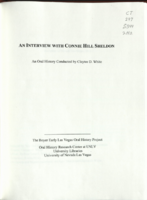
Transcript of interview with Connie Hill Sheldon by Claytee White, February 11, 2013
Date
Archival Collection
Description
Connie Hill Sheldon and her identical twin, Billie, also were members of Rancho High School 's first graduating class of 1962. Connie and Billie were born in 1944 in Oklahoma and spent their early years in southern California before moving to Las Vegas in 1956 with their mother, brother, and stepfather, Gerald Elmore. In Las Vegas Connie and her siblings attended Sunrise Acres Elementary School before going to Rancho, and the family was active with Homesite Baptist Church. While she was at Rancho Connie worked at the Huntridge Theater, and she continued working there after she graduated. In 1968 Connie married fellow Rancho '62 classmate Clyde Sheldon in Goldfield, Nevada. At the time of their marriage Clyde was an active-duty Marine. Over the course of his twenty-year USMC career the Sheldons lived in several places, but following his 1983 retirement they returned to Las Vegas and then moved to Pahrump. In this interview Connie particularly focuses on military life in New Yo
Text
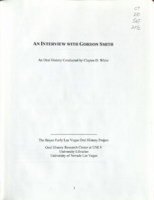
Transcript of interview with Gordon Smith by Claytee White, January 29, 2013
Date
Archival Collection
Description
Gordon Smith was born in Utah, but moved with his family to Babbitt, Nevada in 1947. His father, a barber, moved the family to Las Vegas in 1955. In this interview, Gordon recalls school and after-school pursuits; changes in the town; summer jobs; and college. He also talks about his military service and returning to Las Vegas to take up the razor himself - starting a successful barbering business of over 30 years.
Text
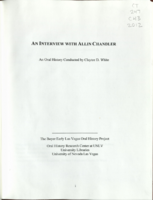
Transcript of interview with Allin Chandler by Claytee White, February 5, 2013
Date
Archival Collection
Description
Another member of Rancho High School's first graduating class of 1962, Allin Chandler charted a course that took him from school football to a distinguished career as a teacher, principal, and Executive Director for the Clark County Association of School Administrators. Allin moved to Las Vegas from Texarkana, Texas with his mother in 1958, joining his father who was serving in the Air Force and stationed at Nellis AFB. Starting 9th grade at J.D. Smith Junior High and continuing on to Rancho the following year. Still actively involved in school athletics, Allin quickly discovered his talent and love for maths and science and eventually earned his degree in math and education. The stories Allin shares in this interview paint a vivid picture of how an intelligent and motivated young man can succeed - and how the class-free world of Las Vegas in the 1950s and 60s offered opportunities that he would never have had in class-conscious world of the South.
Text

Transcript of interview with Cheryl Leonard by Claytee White, February 12, 2013
Date
Archival Collection
Description
First arriving in Las Vegas as an infant, Cheryl Leonard's young life included a brief sojourn in Southern California before returning to Las Vegas in 1954. After attending local elementary and middle schools, she started at Rancho High during the day, and working at the Huntridge theater in the evenings and during the summers. More than just work, though - in this interview, Cheryl recalls school activities from parades to pep club, participating in Helldorado, hanging out with her friends at the Blue Onion and shopping on Fremont Street. After graduation, Cheryl returned to California to attend school before coming back to Las Vegas and taking a job with the Central Telephone Company. This was followed by a brief stint working at the Nevada Test Site before she married in 1964 and concentrated on raising her own daughters in a rapidly growing and changing Las Vegas.
Text

Transcript of interview with Ann Lynch by Emily Powers, May 27, 2008
Date
Archival Collection
Description
Ann Lynch discusses her background - born in Kansas City, 1934; attended Baker University in Baldwin, Kansas; classes at Kansas University; a year in theater; director of PR at Evansville University. In 1959 she came to Las Vegas as director of the clubs at Nellis Air Force Base. Ann shares in depth on her parents and grandparents and on her family today, which includes a brother 14 years younger, her son, and a nephew. She describes Las Vegas in the early sixties, meeting her husband, and her duties as club manager at Nellis. She comments on becoming camp director for the Girl Scout program at Mount Charleston, which led to training scout leaders and board members. When Ann's son Edward went to kindergarten, she took on the PTA job of parliamentarian, then president of Ruth Fyfe ES PTA. She eventually became President of the Las Vegas Area Council, Nevada State PTA president, and finally national president of the PTA. The school named after her (Ann T. Lynch Elementary) has benefited from her other charity organizations. Because of her PTA involvement, Ann became very active in legislation in Washington, D.C., traveling to other countries to help activate parent involvement. She had also worked with Sunrise Hospital during this time and when she was relieved of some of her PTA duties, she helped found the Sunrise Hospital Children's Foundation and the Public Education Foundation. She details the many functions of both foundations. Ann comments on the lobbying she does in the Nevada legislature and in Washington, D.C., medical billing through Medicare and Medicaid, and the ongoing shortage of nurses nationwide. She offers opinions on unions for nurses and mentions robotic surgery, the stroke center, neonatal center, and breast cancer center as evidence of recent developments in medicine at Sunrise Hospital.
Text

Paul M. Lytle interview, March 8, 1995 transcript
Date
Archival Collection
Description
Lytle discusses his birth in Salt Lake City, Utah, his early life in Overton, Nevada, moving around the Southwest United States, and returning to Overton in the early 1930s to work with the Civilian Conservation Corps. Subjects Lytle also talks about in the interview include road and campsite construction at the Valley of Fire State Park, stories about associates and relatives, and being enlisted as a male nurse with the United States Army during World War II. Lastly, Lytle talks about the construction of an exhibit building at Hoover Dam (Boulder Dam) originally used as a headquarters for soldiers during World War II to protect the dam.
Text

Transcript of interview with Christopher Maestas by Claytee White, September 14, 2008
Date
Archival Collection
Description
Christopher “Chris” Maestas (1965-2009) was an engaged educator and leader within the Chicano, Latinx, and Henderson communities. As he traced back his Latinx heritage, he explored his father’s hometown in Llaves, New Mexico, where he and his family were discriminated for their non-white demeanor; and his mother’s paternal Spanish roots; his grandfather came to work in Henderson, Nevada at the Basic Magnesium Industrial (BMI) plants during World War II. The Chicano and Spanish cultures played a significant part in defining his role within the community. For Chris, Chicanos were “people that lived in the southwestern United States particularly southern Colorado, New Mexico and northern Arizona that were originally Mexican citizens before the treaty (Treaty of Guadalupe Hidalgo) was signed and then after the treaty was signed they became Americans.” In this interview, he dives into the difference between Chicano and Spanish cuisine and gives his own tips on how to make Spanish chile relleno. Chris discussed what life was like in Henderson living in Henderson Camp when his grandfather emigrated from Spain in 1943. He described the evolution of the Henderson community in the 50s through his parents’ experiences living in the Hispanic communities of Victory Village and Carver Park. During his childhood in the early 70s, Chris recalled living in Henderson when it was known as Basic and living in a small town-site house. One of his most special recollections was from the summer of 1980, when his family purchased their first set of air-conditioning units. As a passionate teacher and 1984 alumnus from Basic High School, he advocated student engagement as Student Council Advisor. Chris was also an active member of the St. Peter the Apostle, Catholic Church, Knights of the Columbus group and LUPE (Latinos United for Perfect Equality) Club. The LUPE club promoted equality for the Hispanic community and family values. Chris described their Saturday picnics at BMI Park and the annual Henderson Industrial Days festival.
Text

Transcript of interview with Jim Marsh by Claytee D. White, June 5, 2012
Date
Archival Collection
Description
Jim Marsh in Denver, Colorado. Father was the chief for the Colorado Patrol. Mother lived in Nebraska. Jim split time in both places while growing up. He was a service member of the Army and once getting out of the service he started his work with his father at a Ford dealership. Jim went on to work and own dealership in several different areas, Colorado, California, New Mexico, and Washington states before arriving in Las Vegas, NV in 1971. Once arriving in Las Vegas Marsh purchased a dealership called American Auto Mart. Around 1976 Jim Marsh bought the Santa Fe Saloon along with the twenty lots surrounding it for 12,500. This was his first experience in the gaming industry Marsh was the only dealership in the world for 25 years to have a gaming license in a new-car dealership. Marsh discovered interest in Belmont when there was a lone resident Rose Walter. The two bartered and Jim gained land in Belmont and went on to build a bar and church for the town. Marsh eventually went on to own the Skyline Casino. Jim Marsh founded the Nevada Auto Auction in 1987 on Las Vegas Boulevard South Eventually sold it and used the investment to build the Longstreet Casino. Marsh was' also a member of business organizations, Better Business Bureau and The Red Cross Marsh has been a member of the Salvation Army Advisory Board for at least 25 years. Tonopah is another location that Marsh has invested in. After leasing the gaming at the Mizpah Hotel to later buying the Valley Bank building and moving the gaming from Mizpah. It is still successful today. He also purchased the Tonopah Station House which is a hotel bar, and restaurant; along with owning the grocery store Scolari's next-door. Tonopah has proved to be a very good investment for Jim Marsh.
Text
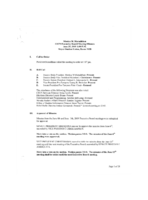
Meeting minutes for Consolidated Student Senate, University of Nevada, Las Vegas, June 27, 2003
Date
Archival Collection
Description
Text
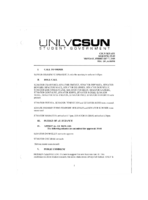
Meeting minutes for Consolidated Student Senate, University of Nevada, Las Vegas, February 07, 2005
Date
Archival Collection
Description
Text
